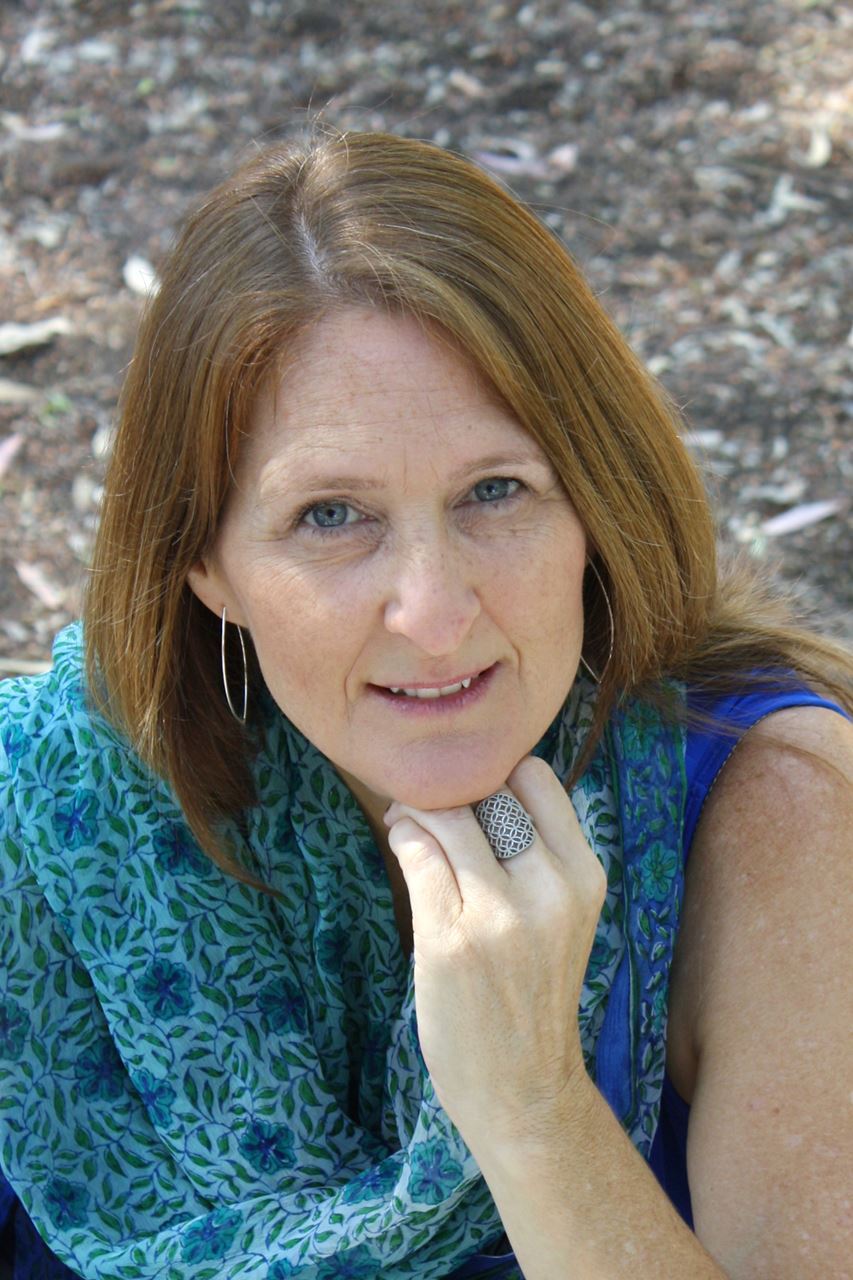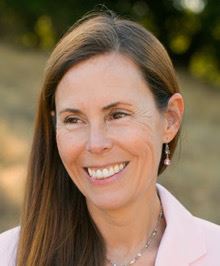 Interviewed by Dominique Yarritu, LMFT, SCV-CAMFT News Editor
Interviewed by Dominique Yarritu, LMFT, SCV-CAMFT News Editor
This month, we are shining the spotlight on Kate Bartenhagen, LMFT who has been an active member of our chapter since she was an associate. Kate has a diversified and rich practice where her focus is on working with adults. I wanted not only to introduce her work and her approach to therapy but also to explore briefly how she has transitioned her practice from in-person to remote access given shelter-in-place restrictions. In mid-April 2020 I interviewed Kate who was my individual supervisor at Almaden Valley Counseling Service, a community mental health agency located in South San Jose.
Dominique: Thank you for agreeing to be featured in the newsletter. When did you start practicing and where are you located?
Kate: Well, I was licensed in 2012 and since then, I have been part of the same group practice of like-minded therapists. My office is in a retreat-like setting in downtown Campbell: we want clients to feel safe and welcomed when they come into our lobby, which is warm and inviting. We have a large coffee table where we display a variety of inspirational books and cards and we have some relaxing music playing in the background.
D: What did you do before becoming a therapist or what made you decide to become a therapist?
K: Well, both are kind of tied in. Hmmm. So, one of the things that made me want to become a therapist is that, I think I was always a good listener, and I often got that feedback. People would say “you’re a good listener,” you know. And, I would take my friends’ confidences and hold them close [pauses]. And the other thing is I was a teacher, originally. So, I got my undergraduate degree in teaching, English education secondary, and I found I couldn’t have the kind of influence on my students I wanted to have because, you’re in a classroom, you’re caught between the administration and the students. And, there’s just too many [of them] to give them individual undivided attention. So, I decided to move into counseling as, you know, a way to work with people on an individual level.
D: Awesome! And, what do you like most about this job?
K: [Sighs]. Ah! I love my clients. I mean I love people, you know. I think they have so much potential, and that most, if not all people, are simply trying to be loved. [They are] trying to have an experience of feeling loved; and sometimes we go about it in ways that aren’t very productive or helpful to ourselves or others. But, if we can see that as people’s underlying intention, then, we can help them [pauses], hopefully, learn to love themselves.
D: That’s beautifully said. Kate, what is the focus of your practice and what is your approach?
K: I specialize in the treatment of substance use disorders and co-occurring mental health issues such as bipolar disorder, depression, and anxiety. I see couples struggling with a variety of issues and often work with infidelity. For my work with clients dealing with addiction, I use a harm-reduction approach which is often misconstrued as excluding abstinence. Harm reduction includes abstinence as a possible goal. Clients come as they are and I use motivational interviewing to identify goals and move towards a healthier lifestyle and relationship to substances.
D: I believe you also practice a mindfulness and somatic-based approach to therapy, is that right?
K: Yes, I use a Mindfulness Based Relapse Prevention (MBRP) approach to work with clients who seek therapy for substance use and process addictions. When I work somatically, I invite the client to drop into the present moment, notice sensations in the body, thoughts in the mind, and emotions that arise. Mindfulness/awareness allows clients to notice and accept themselves and their world as it is. From there, they can decide what actions to take rather than immediately reacting to an event or situation.
D: In addition to using MBRP as a somatic practice, you are also certified in EMDR, correct? Have you been practicing EMDR remotely?
K: Yes, I am an EMDR therapist. I attended my training in Southern California through The Institute for Creative Mindfulness. I chose this training because it was developed specifically for the treatment of substance use disorders and mindfulness. However [pauses] although I know it is possible to practice EMDR remotely, I have not done so yet. I am consulting with Kambria Evans, LMFT this summer to become certified and learn more about EMDR with telehealth.
D: Your practice is varied. You are also a clinical supervisor; tell us about this side of your practice and the challenges of conducting supervision remotely.
K: Yes, I currently have 18 supervisees. I see them in triadic supervision and I also conduct group supervision. This is something I really enjoy; I am passionate about it, actually. I like teaching and find that it is a mutual learning. And in fact, after a lot of questions on both sides initially, meeting with my supervisees remotely is not too bad. It has become easier, probably because we already had a good personal connection, which continues via this new platform.
D: How challenging overall is the shelter in place for you and as a therapist?
K: [Chuckles] It is a challenge for me as an extrovert. And I see the same for my extroverted clients: during this lockdown they are going stir-crazy while the introverts seem to be doing better. Because my approach is somatic and reading all of the clients’ non-verbal cues, telehealth presents a challenge. In the room, I feel a client’s energy and mood more easily. This is a very different time: we, as therapists, are going through the same hurdles and challenges as our clients. We do not have a blueprint for this, we have not acquired the wisdom by having gone through this before them. So, it is about naming what is happening and acknowledging that we are sharing the experience.
D: That’s right, it’s a pretty new situation for this profession and many of us overall. Now, let’s move on to some more personal questions. What are you reading right now?
K: I just finished a couple of books. One is White Fragility. It’s an excellent book that speaks really to primarily white people who perceive that they’re not racist and therefore are guarded about that. So it starts that dialogue of how can we acknowledge where we start from? And that we all have some level of bias.
D: What made you choose this book?
K: I think as social justice and racial issues are extremely important with the client population that we serve in the Bay Area, it’s important to continue to educate ourselves.
D: Any other one you’ve read recently?
K: The other one was Look me in the eye. It’s about a guy who has Asperger’s. He wrote it himself; his brother is also a writer who wrote Running with scissors, that I also read.
D: These are very interesting choices, and so different. What do you usually do for self-care?
K: Some sitting meditation but more mindfulness just in daily life; and nature is hugely comforting to me, so I like to hike [pauses], be outside, walk my dog [laughs].
D: Do you do short or long hikes? Where?
K: Well, you know in my life, we raised our kids hiking all the time, so we’ve hiked in various states… Rocky Mountains, Hawaii, Utah, all over California. Fairly long hikes. Shorter ones more recently [laughs].
D: What is the most important thing you want to pass on to your supervisees?
K: I think to learn to trust themselves is a really big piece, because often, when trainees or associates start out, there’s a perception that there’s a right way to do this, or there’s one way to do this… so, it’s finding their own voice within the context of a theory and [pauses] hmmm… Engaging themselves in the moment in the room with the client.
D: Would you share with us a quote or a saying that is dear to you?
K: Yes, well that’s a quote that I use for myself and interns and maybe everybody. That is: In the beginner’s mind there are many possibilities, in the expert’s mind there are few.
D: That’s a quote that you display in your office, right?
K: [Laughs] Yes!
D: And is there a person, a book, or a movie that was influential for you professionally and/or personally?
K: Yes, immediately, the book that comes to mind is When things fall apart by Pema Chödrön.
D: She’s an amazing individual.
K: Yes, she is. I’ve seen her and I’ve studied with her. Yes, I was on a sitting retreat in Berkeley many years back with her.
D: What is it like to be in the same space as Pema Chödrön?
K: She’s a lot like Jack Kornfield, someone who is just really centered and present and calm and real… real, yeah. She’s beautiful.
D: I have so many more questions to ask you but we are running out of space!
K: [laughs] These are fun questions.
D: Thank you Kate, for your time, and for telling us not only about your practice but also about you and what brought you to the world of psychotherapy.
K: Thank you!
 Dominique Yarritu is the editor of the SCV-CAMFT News newsletter and is a newly licensed marriage and family therapist who focuses her practice on adults and couples using a psychodynamic and Jungian approach. She is a doctoral candidate at Pacifica Graduate Institute in Depth Psychology with an emphasis in Somatic Studies and is currently training in somatic experiencing. She sees adults and couples in private practice at Family Matters Counseling Services and she can be reached at dyarritu@familymatters.expert.
Dominique Yarritu is the editor of the SCV-CAMFT News newsletter and is a newly licensed marriage and family therapist who focuses her practice on adults and couples using a psychodynamic and Jungian approach. She is a doctoral candidate at Pacifica Graduate Institute in Depth Psychology with an emphasis in Somatic Studies and is currently training in somatic experiencing. She sees adults and couples in private practice at Family Matters Counseling Services and she can be reached at dyarritu@familymatters.expert.
References
Burroughs, A. (2002). Running with scissors: A memoir. New York, NY: Picador.
Chödrön, P. (1997). When things fall apart: Heart advice for difficult times. Boulder, CO: Shambhala Publications.
DiAngelo, R. (2018). White fragility: Why it’s so hard for white people to talk about racism. Boston, MA: Beacon Press.
Robison, J. E. (2008). Look me in the eye: My life with Asperger’s. New York, NY: Random House.
